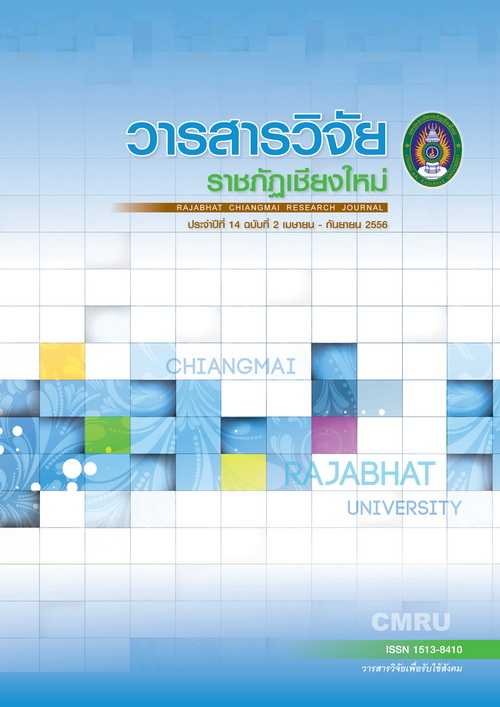ปัจจัยที่บีผลต่อการยอบรับระบบคลาวด์คอมพิวดิ้ง ของผู้ที่ทำงานด้านเทคโนโลยีสารสนเทศ
DOI:
https://doi.org/10.14456/rcmrj.2013.96147Keywords:
ระบบคลาวด์คอมพิวติ้ง, ผู้ที่ทำงานด้านเทคโนโลยีสารสนเทศ, Cloud computing system, Information technology workersAbstract
การศึกษาครั้งนี้เพื่อศึกษาและเปรียบเทียบระดับความสำคัญของปีจจัยที่มีผลต่อการยอมรับระบบคลาวด์คอมพิวติ้งของผู้ที่,ทำงานด้านเทคโนโลยีสารเทศ โดยตัวแปรต้นจำแนกตามปัจจัยลักษณะส่วนบุคคล ได้แก่ เพศ อายุ ระดับการศึกษาตำแหน่งงาน อายุการทำงาน และปัจจัยด้านคุณลักษณะของระบบคลาวด์คอมพิวติ้ง ได้แก่ ด้านความเชื่อถือได้และความปลอดภัยของข้อมูล ด้านเทคโนโลยีที่รองรับในการทำงาน ด้านคุณภาพและประสิทธิภาพในการทำงาน ด้านอุปกรณ์และสถานที่ตั้งไม่ขึ้นต่อกัน ส่วนตัวแปรตามการยอมรับระบบคลาวด์คอมพิวติ้งได้แบ่งปัจจัยที่ศึกษาเป็นการยอมรับ 5 ขั้น ได้แก่ขั้นรับรู้ ขั้นสนใจ ขั้นตัดสินใจ ขั้นทดลองใช้ และขั้นยอมรับ โดยเก็บข้อมูลจากแบบสอบถามจำนวน 200 ขุด จากกลุ่มตัวอย่างคือ ผู้ที่,ทำงานด้านเทคโนโลยีสารสนเทศ
สถิติที่ใช้1นการวิเคราะห์คือ F-test การวิเคราะห์ความแปรปรวนทางเดียว (One-way Analysis Variance: ANOVA)และเปรียบเทียบความแตกต่างของค่าเฉลี่ยเป็นรายคู่น้อยที่สุด LSD (Least Significant Different) ผลการศึกษาพบว่าปัจจัยส่วนบุคคลไม่มีผลต่อการยอมรับระบบคลาวด์คอมพิวติ้ง แต่ปัจจัยด้านคุณลักษณะมีผลต่อระดับการยอมรับระบบคลาวด์คอมพิวติ้งโดยจำแนกตามปัจจัยด้านคุณลักษณะของระบบคลาวด์คอมพิวติ้ง ได้แก่ ด้านความเชื่อถือได้และความปลอดภัยของข้อมูลจะยอมรับในขั้นตัดสินใจและขั้นยอมรับเท่านั้น ด้านเทคโนโลยีที่รองรับในการทำงาน ด้านคุณภาพและประสิทธิภาพในการทำงาน และด้านอุปกรณ์และสถานที่ตั้งไม่ขึ้นต่อกัน จะยอมรับทุกขั้นยกเว้นขั้นรับรู้ โดยปัจจัยที่มีระดับความคิดเห็นมากที่สุดคือ ด้านอุปกรณ์และสถานที่ตั้งไม่ขึ้นต่อกัน มีค่าอยู่ที่ X = 4.38 รองลงมาคือ ด้านคุณภาพและประสิทธิภาพในการทำงาน มีค่าอยู่ที่ X = 4.35 ด้านเทคโนโลยีที่รองรับในการทำงาน มีค่าอยู่ที่ X = 4.20 และด้านความเชื่อถือได้และความปลอดภัยของข้อมูล มีค่าอยู่ที่ X = 3.51
FACTORS AFFECTING THE ACCEPTANCE MAKING ON CLOUD COMPUTING SYSTEM OF INFORMATION TECHNOLOGY WORKERS
The research aims to study and compare the important level of factors affecting to the acceptance of Cloud Computing Systems of information technology workers. The independent variables are personal factor identified by gender, age, education, jobs position, and job tenure; and feature of Cloud Computing Systems factor including reliability and security of information, technology, quality and performance, and equipment and location. The dependent variable is the acceptance of Cloud Computing Systems which was divided into five stages including awareness, interested, making decision, trial, and acceptance. Questionnaire was used to collect data from 200 samples that are information technology workers.
The statistical analyses used in this study are F-test, One-way Analysis Variance (ANOVA), and Least Significant Different (LSD). The results show that personal factor has no affect to the acceptance of Cloud Computing Systems. However, features of the Cloud Computing Systems factor has affect to the acceptance of Cloud Computing Systems. This factor includes reliability and security of information which accept Cloud Computing Systems on making decision and acceptance levels; technology, quality and performance, and equipment and location accept every level except awareness. The result found that acceptance levels are a high level. The highest acceptance level is equipment and the location at X = 4.38; follow by quality and performance X = 4.35; technology X = 4.20; and reliability and security of information X = 3.51.
Downloads
Downloads
How to Cite
Issue
Section
License
1. Articles, information, content, images, etc published in the “Community and Social Development Journal” are copyrighted by the Community and Social Development Journal, Chiang Mai Rajabhat University. In order to properly distribute the articles through print and electronic media, the authors still hold the copyright for the published articles under the Creative Commons Attribution (CC BY) license, which allows the re-distribution of the articles in other sources. References must be made to the articles in the journal. The authors are responsible for requesting permission to reproduce copyrighted content from other sources.
2. The content of the articles appearing in the journal is the direct responsibility of the article authors. The editorial board of the journal does not necessarily agree with or share any responsibility.














